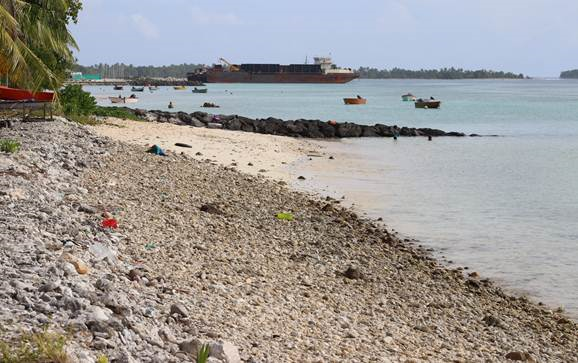
Pacific island countries continue to plan and implement development projects to improve national capital and provide a better standard of living for its people. Large infrastructural developments such as roads, coastal housing, and energy projects have a direct bearing on island ecosystems particularly fragile atoll environments.
The Environmental Impact Assessment (EIA) is a principal instrument for planning, assessing and managing development projects with the aim to support sustainable and resilient development goals and green growth.
The Secretariat of the Pacific Regional Environment Programme (SPREP) has a long history of leading EIA capacity-building across the Pacific region supporting EIA awareness-raising and training programmes in member countries.
Through SPREP’s Environmental Monitoring and Governance (EMG) Programme, Mr Jope Davetanivalu, Environment Planning Adviser, and Dr. Greg Barbara, Environment Assessment and Planning Officer recently completed a three-day training workshop to introduce the EIA process in Tuvalu.
The Department of Environment hosted the training workshop which was attended by representatives from Foreign Affairs, Trade, Waste Management, Health, Tourism and Labour, the private sector and NGOs. The training was held 25-27 July, 2018 at the Media Centre in Funafuti.

The training on the EIA process was timely as the Government of Tuvalu recently endorsed the Environment Protection Amendment Regulations 2017 . The Regulations include a guideline on the EIA process from screening projects through to review, approval, monitoring and enforcement. It also includes information on environmental and social issues which are part of the EIA process.
The recently published, SPREP regional guidelines on the EIA process, Strengthening Environmental Impact Assessment, Guidelines for Pacific Island Countries and Territories, was a useful reference resource for the training.
“The EIA Regulations provide the basis for effective and sound planning and decision making on sustainable development,” said Mr Davetanivalu.
“It also forms the basis for the formulation of the National Environmental Management Strategy and assists the Government to meet its reporting obligations to national, regional and international frameworks and instruments, including the multilateral environment agreements.”
Participants took part in a ‘mock EIA taskforce’ exercise to review EIA scoping and a historical EIA report as well as develop Terms of References. Through the training participants also made an assessment on a decision to recommend approval or rejection and set conditions or requests for additional studies and seek more information. The training also included a field visit to several new development sites where participants practiced and applied what they had learned in the EIA process during the training.
“Vinaka vakalevu, fa’a feti lasi and thank you to SPREP for making the week an enjoyable one. It has been a successful three-day l meeting for me, I learnt so much and was also able to share knowledge and ideas with everyone in the room,” said Ms. Miriam Uluiviti, representative from the Waste Management Unit.
“The training was very informative, and very timely from day one.”
Participants expressed a desire to see more use of the EIA process applied to new development projects across Tuvalu, noting that use of the process is also driven by an understanding of its existence. Participants also requested expanding the training to the outer islands, community and chiefs.
The training on the EIA process for Tuvalu was supported through the ACPMEA 2 Project, an initiative of the African, Caribbean and Pacific Group of States funded by the European Union, implemented by United Nations Environment and executed SPREP.
For more information on the ACPMEA 2 project, please contact Ms. Easter Galuvao, Director, Environmental Monitoring and Governance Programme on Email: [email protected].

To learn more about the ACP MEAs 2 project, please visit http://www.sprep.org/Projects/acp-meas-project